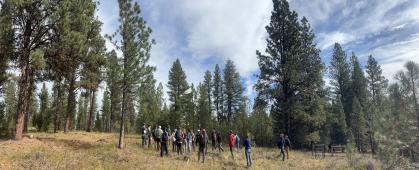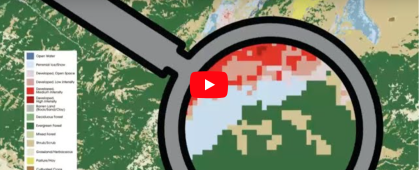Meet Megan Moore, a PhD student at the University of Montana (Department of Society and Conservation) and a member of the EPSCoR Track 1 research team. She is a research assistant with the Upper Clark Fork River team and is also a human geographer studying the Anaconda Co. Smelter Superfund site. In this interview, Megan shared information about her work, studies and career pathway with the Montana Girls STEM Collaborative, an outreach program of Montana NSF EPSCoR. Her interview is reprinted here in order to share career pathways with young people in Montana.

What do you do for your research?
As a graduate student, I have three jobs to juggle. The first job is going to class, learning just like any other student.
The second job I have is a Research Assistant. As a Research Assistant, I work on a large statewide project that focuses on the water quality and restoration of the Upper Clark Fork River. The Upper Clark Fork River has been affected by heavy metals, which originated from historic mining and smelting operations. We are trying to better understand the community dynamics related to these water quality issues.
My third job is my own research as a human geographer. A human geographer is someone that is interested in people and their connections/relationships to their environment. My research looks at the Anaconda Co. Smelter Superfund site. I talk to community members about their perspectives on the cleanup process. I am also interested in how their perceptions of risk, or how it feels to grow up, live, recreate, and work in an area with high levels of contamination.
Since I am a social scientist, I don’t work in a lab running experiments. Rather my work is a combination of fieldwork and computer work. My fieldwork consists of conducting interviews in the community I am studying along with spending time in the community in general- going to community events, public meetings, hanging out and chatting with people at cafes and restaurants. It’s pretty fun! Once I have done my interviews or surveys, I enter them into the computer to better understand them- studying the transcripts and surveys in a way- to make conclusions.
My work is important because it connects the social world with the environmental world. We are often able to assess the physical science questions such as how contaminated a stream is, what type of contamination it is, or how it affected fish or other animals. However, the social questions are often the most complex and become more interesting the further you dive in- questions like does the contamination bother the community, are there innovative solutions they use to cleanup contamination, or who has the power to make the changes.
What did you like to do as a young person? At what age and how did you know you wanted to be a scientist?
I went camping every summer with my dad and sister in the Sierras in northern California. I grew up outside of Chicago where the closest thing to a mountain or hill I had ever seen was a garbage dump. Most people didn’t recreate how we all do in Montana- we did not spend summers hiking, biking, adventuring, floating or the winters skiing and snowboarding. It opened my mind to how big the U.S. and world are and how much there is to explore. My favorite memories of these times were the smell of the forests, the endless activities we found (hiking, kayaking on the lake, getting lost, identifying flowers and trees, roasting marshmallows, the crisp air). These trips every summer made me feel that I had found my “place” in the West. I wanted to learn more about the environment and how I could better serve it.
I studied Political Science and Environmental Studies as an undergraduate but I was still unsure which direction to take my career. During my last year of college, as I debated where to go in life, my professor changed my mind. He was a 75-year-old man that jumped on a table and started flapping his arms like wings and yelling “I AM A SANDHILL CRANE” as he talked about their migration patterns and loss of habitat. It was at that moment that I felt no one else had ever talked so passionately about a topic. He confirmed a career studying the environment was what I wanted to do.
My journey was a long one, I collected native plant seeds and controlled invasive species in Illinois, I studied plants and sage-grouse habitat in Nevada, developed watershed restoration plans and built fish habitat in Michigan, I taught science education in forest preserves and native prairies throughout Illinois, and monitored streams in Montana, Idaho, California, Oregon, and Washington before coming back to graduate school. All of these experiences taught me more about ecosystems and the challenges they face, but often left out the important piece of the role we play as humans. This led me back to graduate school to see where humans and the environment connect.
Who were some of the role models, mentors or other adults who influenced you as a young person?
I had very supportive parents, teachers, and coaches growing up. They were not as familiar with the science realm but encouraged me to study what I enjoyed.
What advice would you give to a Montana kid who is interested in a career like yours?
I measure the success of my career by the change and the good I put out into the world. I do not measure it in the money I make, but rather how much I enjoy it. I encourage you to do the same! If there is something that is really interesting to you, like collecting and identifying insects or birds, learning about volcanoes, or searching for fossils, do it! Read about, watch videos on it, find camps or classes on it, and talk to experts about it.
I was the only one of my friends that left college and didn’t go work in an office. I felt that maybe I was “doing it wrong” because my job was outside. I did two AmeriCorps positions where I gained fieldwork experience such as collecting identifying native plant species, soil types, planting riparian vegetation, writing grants, and working with local communities. It is normal to not know your path now or in 5 or 10 years. Try, discover, and explore all of your interests- they may change over time.
If you are not interested in science right now, that is okay too, follow what topics you do find interesting!
Remember that you are unique and special and whatever you are passionate about is what you should pursue, because we need more of that in the world.

